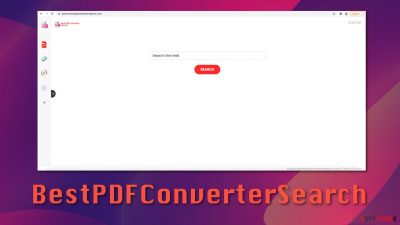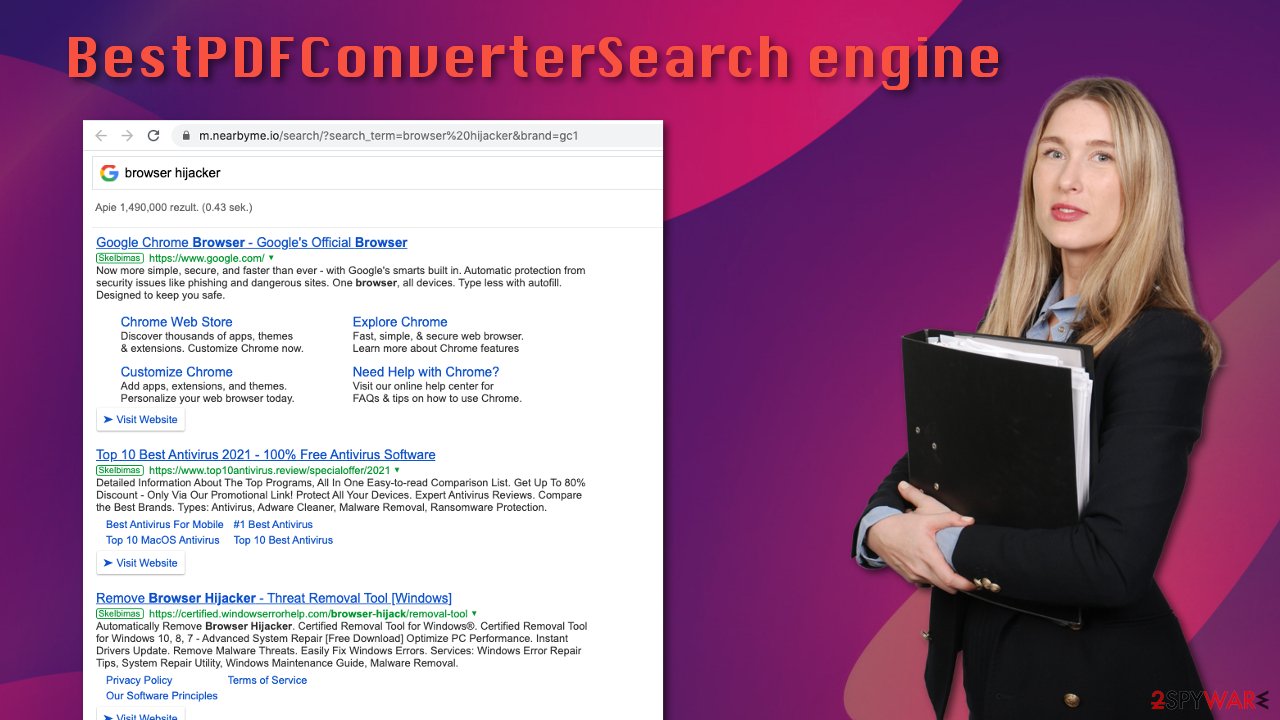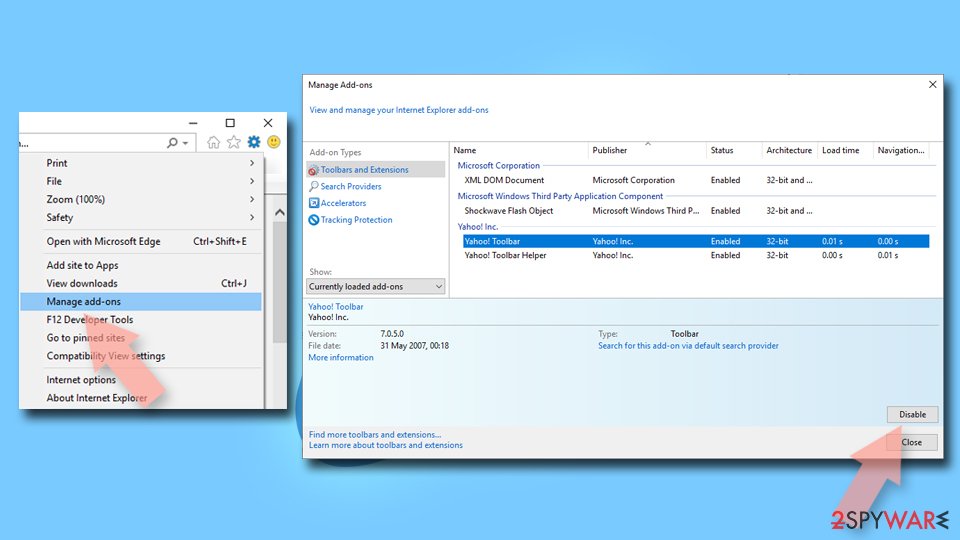BestPDFConverterSearch browser hijacker (virus) - Free Guide
BestPDFConverterSearch browser hijacker Removal Guide
What is BestPDFConverterSearch browser hijacker?
BestPDFConverterSearch changes your browser settings

Having your browsers' settings changed without your knowledge is annoying as well as having to navigate a different search engine. All of this can be confusing for not so technologically-savvy people as extensions like BestPDFConverterSearch usually do not get added by users themselves.
They get spread through freeware installations,[1] potentially unwanted programs,[2], and deceptive ads. Users should be more careful while browsing the internet and pay attention when downloading something to their machine.
The hijacker tries to appeal to people by offering some basic functions like a PDF and currency converter, calculator, and the ability to save websites. These are easily accessible with a click of a button on any browser or even your system so it is useless and just not worth it.
This hijacker is a clone of many others, just with a different name. Some examples that we already wrote about include BestStreamSearch, FreeSearchMusic, BestADSBlock, WebSearchSport. Their purpose is to monetize you by showing you ads and collecting data about your browsing behavior. It is a potential security risk to continue to use BestPDFConverterSearch so read the article to find out how to remove it.
| NAME | BestPDFConverterSearch |
| TYPE | Browser hijacker; potentially unwanted program |
| SYMPTOMS | Altered search results, different homepage, and new tab addresses, appearance |
| DISTRIBUTION | Deceptive advertisements, freeware installations, PUPs |
| DANGERS | Altered search results can lead to misinformation, the extension can collect various data related to users' habits online |
| ELIMINATION | Remove the unwanted extension via browser settings |
| FURTHER STEPS | Use a maintenance tool FortectIntego to optimize your system and fix any damaged files |
While having BestPDFConverterSearch on your browser, you will experience a difference in search results. This is because a different search engine is applied. Usually, hijackers do not create their own search engines but use already existing ones to make them functional. Hijackers from this same family use a few of them:
- Bing
- Yahoo
- nearbyme.io
- searchlee.com

The search results could be injected with sponsored content, so what comes up is not always what you were searching for. It makes it difficult to use and navigate through the web. There is nothing beneficial you will get out of this, so we suggest removing it as quickly as possible. Hijackers are using you to generate revenue by clicking links through their portals.[3]
If you use it for some time, your machine can become slow because of cookie and cache collection via portal.bestpdfconvertersearch.com or feed.bestpdfconvertersearch.com. A statement in their privacy policy:
By Using the Product, you may enable us or third parties to access, use, and collect a variety of information, regarding your Internet Browser, your browsing habits, and information about your computer including by usage of cookies.
This means that they can provide information gathered about you to third parties and not be responsible for what they do with it. Data collected about your browsing behavior, habits, purchases can be provided to advertisers to further display ads to you.
Now, usually, cookies are a good thing. They help websites know your preferences for a better user experience. But having this information passed on to unknown sources is not a welcome feeling. Having basic functions that are easily accessible is just not worth to trade in for shady search engines, having all your settings changed, and possibly your information exposed.

Removal of BestPDFConverterSearch browser hijacker
The application could have gotten into your browser because you added the extension yourself accidentally or knowingly. Be it a deceptive ad, a redirect from a shady website, and so on. In this case, the removal should be easy by accessing your browser settings.
First, you can change your homepage back to normal.
- Click the menu and choose Settings.
- Look for a suspicious site in the On startup section.
- Click on Open a specific or set of pages and click on three dots to find the Remove option.
Next, you will have to remove the add-on manually via your browser settings. We have guides for the most popular ones like Chrome, Mozilla Firefox, or Safari.
Google Chrome
- Open Google Chrome, click on the Menu (three vertical dots at the top-right corner) and select More tools > Extensions.
- In the newly opened window, you will see all the installed extensions. Uninstall all the suspicious plugins that might be related to the unwanted program by clicking Remove.
![Remove extensions from Chrome Remove extensions from Chrome]()
MS Edge:
- Select Menu (three horizontal dots at the top-right of the browser window) and pick Extensions.
- From the list, pick the extension and click on the Gear icon.
- Click on Uninstall at the bottom.
![Remove extensions from Edge Remove extensions from Edge]()
MS Edge (Chromium)
- Open Edge and click select Settings > Extensions.
- Delete unwanted extensions by clicking Remove.
![Remove extensions from Chromium Edge Remove extensions from Chromium Edge]()
Mozilla Firefox
- Open Mozilla Firefox browser and click on the Menu (three horizontal lines at the top-right of the window).
- Select Add-ons.
- In here, select unwanted plugin and click Remove.
![Remove extensions from Firefox Remove extensions from Firefox]()
Safari
- Click Safari > Preferences…
- In the new window, pick Extensions.
- Select the unwanted extension and select Uninstall.
![Remove extensions from Safari Remove extensions from Safari]()
Internet Explorer:
- Open Internet Explorer, click on the Gear icon (IE menu) on the top-right corner of the browser
- Pick Manage Add-ons.
- You will see a Manage Add-ons window. Here, look for suspicious plugins. Click on these entries and select Disable.
![Remove add-ons from Internet Explorer Remove add-ons from Internet Explorer]()
It is recommended to use FortectIntego maintenance tool to clear your browsers completely, increase the speed and fix any damaged files.
Potentially unwanted programs come disguised as handy tools
If it is not a simple extension and you have not added it yourself, the process could be a little more complicated. The second possibility is that you downloaded a potentially unwanted application on your system which is performing tasks in the background without your knowledge. Software bundling is the common method to spread apps like this.
Which program is responsible for acting as a hijacker can be difficult to tell if you do not have experience. If you are unsure of yourself it is best to use anti-malware tools that will scan your machine, locate it, eliminate it, and prevent such infections in the future. SpyHunter 5Combo Cleaner and Malwarebytes are great and trusted options for the task. If you still want to accomplish this manually, we have instructions for Windows and macOS users:
Instructions for Windows 10/8 machines:
- Enter Control Panel into Windows search box and hit Enter or click on the search result.
- Under Programs, select Uninstall a program.
![Uninstall from Windows 1 Uninstall from Windows 1]()
- From the list, find the entry of the suspicious program.
- Right-click on the application and select Uninstall.
- If User Account Control shows up, click Yes.
- Wait till uninstallation process is complete and click OK.
![Uninstall from Windows 2 Uninstall from Windows 2]()
If you are Windows 7/XP user, proceed with the following instructions:
- Click on Windows Start > Control Panel located on the right pane (if you are Windows XP user, click on Add/Remove Programs).
- In Control Panel, select Programs > Uninstall a program.
![Uninstall from Windows 7/XP Uninstall from Windows 7/XP]()
- Pick the unwanted application by clicking on it once.
- At the top, click Uninstall/Change.
- In the confirmation prompt, pick Yes.
- Click OK once the removal process is finished.
Instructions for Mac machines:
- From the menu bar, select Go > Applications.
- In the Applications folder, look for all related entries.
- Click on the app and drag it to Trash (or right-click and pick Move to Trash)
![Uninstall from Mac 1 Uninstall from Mac 1]()
To fully remove an unwanted app, you need to access Application Support, LaunchAgents, and LaunchDaemons folders and delete relevant files:
- Select Go > Go to Folder.
- Enter /Library/Application Support and click Go or press Enter.
- In the Application Support folder, look for any dubious entries and then delete them.
- Now enter /Library/LaunchAgents and /Library/LaunchDaemons folders the same way and terminate all the related .plist files.
![Uninstall from Mac 2 Uninstall from Mac 2]()
For additional options check the instructions below this post.
You may remove virus damage with a help of FortectIntego. SpyHunter 5Combo Cleaner and Malwarebytes are recommended to detect potentially unwanted programs and viruses with all their files and registry entries that are related to them.
Getting rid of BestPDFConverterSearch browser hijacker. Follow these steps
Remove from Microsoft Edge
Delete unwanted extensions from MS Edge:
- Select Menu (three horizontal dots at the top-right of the browser window) and pick Extensions.
- From the list, pick the extension and click on the Gear icon.
- Click on Uninstall at the bottom.

Clear cookies and other browser data:
- Click on the Menu (three horizontal dots at the top-right of the browser window) and select Privacy & security.
- Under Clear browsing data, pick Choose what to clear.
- Select everything (apart from passwords, although you might want to include Media licenses as well, if applicable) and click on Clear.

Restore new tab and homepage settings:
- Click the menu icon and choose Settings.
- Then find On startup section.
- Click Disable if you found any suspicious domain.
Reset MS Edge if the above steps did not work:
- Press on Ctrl + Shift + Esc to open Task Manager.
- Click on More details arrow at the bottom of the window.
- Select Details tab.
- Now scroll down and locate every entry with Microsoft Edge name in it. Right-click on each of them and select End Task to stop MS Edge from running.

If this solution failed to help you, you need to use an advanced Edge reset method. Note that you need to backup your data before proceeding.
- Find the following folder on your computer: C:\\Users\\%username%\\AppData\\Local\\Packages\\Microsoft.MicrosoftEdge_8wekyb3d8bbwe.
- Press Ctrl + A on your keyboard to select all folders.
- Right-click on them and pick Delete

- Now right-click on the Start button and pick Windows PowerShell (Admin).
- When the new window opens, copy and paste the following command, and then press Enter:
Get-AppXPackage -AllUsers -Name Microsoft.MicrosoftEdge | Foreach {Add-AppxPackage -DisableDevelopmentMode -Register “$($_.InstallLocation)\\AppXManifest.xml” -Verbose

Instructions for Chromium-based Edge
Delete extensions from MS Edge (Chromium):
- Open Edge and click select Settings > Extensions.
- Delete unwanted extensions by clicking Remove.

Clear cache and site data:
- Click on Menu and go to Settings.
- Select Privacy, search and services.
- Under Clear browsing data, pick Choose what to clear.
- Under Time range, pick All time.
- Select Clear now.

Reset Chromium-based MS Edge:
- Click on Menu and select Settings.
- On the left side, pick Reset settings.
- Select Restore settings to their default values.
- Confirm with Reset.

Remove from Mozilla Firefox (FF)
Remove dangerous extensions:
- Open Mozilla Firefox browser and click on the Menu (three horizontal lines at the top-right of the window).
- Select Add-ons.
- In here, select unwanted plugin and click Remove.

Reset the homepage:
- Click three horizontal lines at the top right corner to open the menu.
- Choose Options.
- Under Home options, enter your preferred site that will open every time you newly open the Mozilla Firefox.
Clear cookies and site data:
- Click Menu and pick Settings.
- Go to Privacy & Security section.
- Scroll down to locate Cookies and Site Data.
- Click on Clear Data…
- Select Cookies and Site Data, as well as Cached Web Content and press Clear.

Reset Mozilla Firefox
If clearing the browser as explained above did not help, reset Mozilla Firefox:
- Open Mozilla Firefox browser and click the Menu.
- Go to Help and then choose Troubleshooting Information.

- Under Give Firefox a tune up section, click on Refresh Firefox…
- Once the pop-up shows up, confirm the action by pressing on Refresh Firefox.

Remove from Google Chrome
Delete malicious extensions from Google Chrome:
- Open Google Chrome, click on the Menu (three vertical dots at the top-right corner) and select More tools > Extensions.
- In the newly opened window, you will see all the installed extensions. Uninstall all the suspicious plugins that might be related to the unwanted program by clicking Remove.

Clear cache and web data from Chrome:
- Click on Menu and pick Settings.
- Under Privacy and security, select Clear browsing data.
- Select Browsing history, Cookies and other site data, as well as Cached images and files.
- Click Clear data.

Change your homepage:
- Click menu and choose Settings.
- Look for a suspicious site in the On startup section.
- Click on Open a specific or set of pages and click on three dots to find the Remove option.
Reset Google Chrome:
If the previous methods did not help you, reset Google Chrome to eliminate all the unwanted components:
- Click on Menu and select Settings.
- In the Settings, scroll down and click Advanced.
- Scroll down and locate Reset and clean up section.
- Now click Restore settings to their original defaults.
- Confirm with Reset settings.

Delete from Safari
Remove unwanted extensions from Safari:
- Click Safari > Preferences…
- In the new window, pick Extensions.
- Select the unwanted extension and select Uninstall.

Clear cookies and other website data from Safari:
- Click Safari > Clear History…
- From the drop-down menu under Clear, pick all history.
- Confirm with Clear History.

Reset Safari if the above-mentioned steps did not help you:
- Click Safari > Preferences…
- Go to Advanced tab.
- Tick the Show Develop menu in menu bar.
- From the menu bar, click Develop, and then select Empty Caches.

After uninstalling this potentially unwanted program (PUP) and fixing each of your web browsers, we recommend you to scan your PC system with a reputable anti-spyware. This will help you to get rid of BestPDFConverterSearch browser hijacker registry traces and will also identify related parasites or possible malware infections on your computer. For that you can use our top-rated malware remover: FortectIntego, SpyHunter 5Combo Cleaner or Malwarebytes.
How to prevent from getting browser hijacker
Protect your privacy – employ a VPN
There are several ways how to make your online time more private – you can access an incognito tab. However, there is no secret that even in this mode, you are tracked for advertising purposes. There is a way to add an extra layer of protection and create a completely anonymous web browsing practice with the help of Private Internet Access VPN. This software reroutes traffic through different servers, thus leaving your IP address and geolocation in disguise. Besides, it is based on a strict no-log policy, meaning that no data will be recorded, leaked, and available for both first and third parties. The combination of a secure web browser and Private Internet Access VPN will let you browse the Internet without a feeling of being spied or targeted by criminals.
No backups? No problem. Use a data recovery tool
If you wonder how data loss can occur, you should not look any further for answers – human errors, malware attacks, hardware failures, power cuts, natural disasters, or even simple negligence. In some cases, lost files are extremely important, and many straight out panic when such an unfortunate course of events happen. Due to this, you should always ensure that you prepare proper data backups on a regular basis.
If you were caught by surprise and did not have any backups to restore your files from, not everything is lost. Data Recovery Pro is one of the leading file recovery solutions you can find on the market – it is likely to restore even lost emails or data located on an external device.
- ^ Sage Driskell. The Danger of Free Proprietary Software. The20. IT Service.
- ^ Max Roberts. What is a PUA (Potentially Unwanted Application) or PUP (Potentially Unwanted Program)?. GoIncognito. Security Solutions.
- ^ Wikipedia. Pay-per-click. Wikipedia. Free Encyclopedia.
























